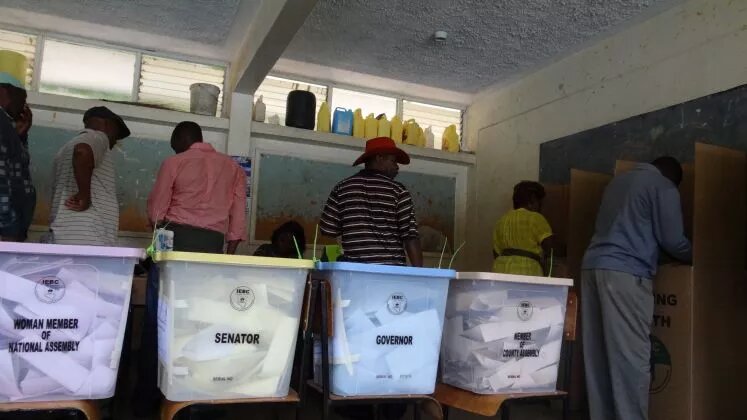
Introduction
Kenya's General Election conducted on 4th March 2013 proved to be an interesting point of discussion given its complexity, and against the background of the chaos after the last general election in 2007 during which at least 1,200 people lost their lives and hundreds of thousands were displaced. As stated, this election thus became not only sensitive in terms of how government would handle the electioneering process which had caused discontent and sparked ethnic killings in parts of the country, but also the parallel process of the prosecution of some of the political heavy weights who are facing charges of crimes against humanity at the Hague based ICC.
It was however clear right from the start that Kenya would have a new president.
Rationale for the Web Dossier
During an election like the one Kenya was facing, people from all over the world are always looking for an up close and candid analysis of ongoing activities. This analysis will include real time articles also developed by partners, and which contributed to the debate in the run up to the elections as well as various expert pieces on unfolding issues as Kenya enters the post election period. It is planned that articles considered shall be based on actual facts that can be proven or even public opinion whose sources can be objectively verified, and that they will be an eye opener on certain issues for people within and without the country thus igniting responses to the election and salients points that need to be considered by the next government. The dossier must in essence contain detailed information, useful to readers and not streetwise information based on hearsay, if it is to find its place in international discussions on the election process in Kenya.
The African Research and Resource Forum (ARRF) Kenya Elections Project
The African Research and Resource Forum (ARRF) Kenya Elections project contributes to peaceful elections management and state stability in Kenya, by reflecting and analyzing the legal framework, political processes as well as practice of elections management. It offers opinion on contested aspects of the electoral and political process. Analysis is undertaken by a team of analysts comprised of individuals from the academia, civil society and government. Each output of the project is peer reviewed by six different individuals and debated at a review meeting, so as to ensure quality. The project regularly publishes its outputs as Elections Dispatch, which is disseminated in soft and hardcopy.
The Elections Dispatch is a practical policy oriented publication. It feeds into and informs the electoral and political process by providing practical and easy solutions to policy makers in government, civil society, development partners, and the general public.
- Civil Society, Civic Education and Election Observation in Kenya. Dispatch No. 1 examines the role of civil society in civic and voter education and election observation since the re-introduction of multiparty democracy in Kenya. It draws some lessons and conclusions about the role of civil society in civic education and voter education and election observation that might have a bearing on the next elections.
- Social Identities and Political Mobilization: The Case of Kenya in the run-up to 2013 General Election. Dispatch No. 2 focuses on Social Identities and Political Mobilization. The provisions in the permeable of being proud of our ethnic, cultural and religious diversity and the determination to live in peace and unity as one indivisible nation must be written in the hearts of all.
- Gender Dimension of Representational Politics in Kenya: The Quota and Beyond. Dispatch No. 3 examines the current democratic political transition underway in Kenya offers a unique opportunity for gender champions, inside and outside the State, to further engender the restructuring of governance institutions through the implementation of laws and policies that facilitate the realization of gender equality and justice. This transition also affords a rare opportunity to apply lessons learnt from the experiences of other African countries that have attained the minimum 30% gender threshold.
- The 2013 Kenyan Elections: Regional Dimensions and Implications. Dispatch No.4 critically examines the 2013 elections in Kenya with a specific focus on the regional dimensions and its implications. The intention is to draw some lessons and conclusions about the 2013 elections in Kenya which are likely to be influenced by regional pressures in which the outcomes will affect regional dynamics.
- Covering Elections: Mainstream Media Performance and its Implications for the Forthcoming General Election. Dispatch No.5 analyses the media performance and its implications for the forthcoming general elections. This paper, using various media monitoring reports, looks at how the mainstream media covered the 2007 general election, emerging concerns on how mainstream media cover contentious issues and the implications for Kenya’s next general election in particular and democracy in general.
- The Impact of Election (2007/2008) Violence on Kenya’s Economy: Lessons Learned?. Dispatch No.6 critically analyses the impact of election (2007/2008) violence on Kenya’s economy and the lessons learnt. It further discusses the plummeting growth after the elections; with the foreign direct investment dropping to $183 million in 2008 following the post-election chaos which is still to stabilize five years later and we are yet to reach that level of economic growth again, despite the relative stabilization of the economy.
- Violence and Women Participation in Electoral Processes: Challenges and Prospects for the 2013 Elections in Kenya. Dispatch No. 7 critically examines the genesis of the unending cycle of violence against women as well as factors that often sustain that violence. The paper also highlights the magnitude of electoral violence against women in Kenya and suggests some mechanisms that could be utilized to protect women aspirants and voters as we enter the last few months to the General Election.